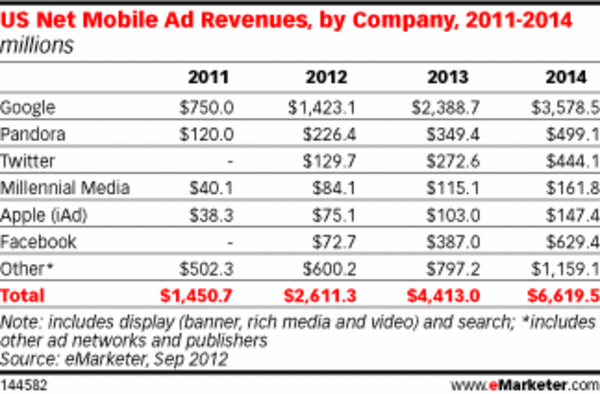News outlets breathlessly reported last week that Twitter was projected to overtake Facebook in mobile-ad revenue for 2012. But they missed the bigger picture.
Twitter is projected to generate $129.7 million in mobile-ad revenue this year, well ahead of Facebook’s $72.7 million. What critics and journalists missed in hurried analyses of that news was Facebook’s projection that annual mobile-ad revenue will grow to $629.4 million in 2013 and 2014. That’s second only to Google, which is expected to generate $3.58 billion in mobile revenue in the same period.

Not bad for Facebook, a company that didn’t bring in a dime in mobile-ad revenue last year and which has been plagued by questions about its mobile strategy since announcing it would go public in February.
Pandora Is A Good/Bad Example
Still, it takes more than revenue to make a profit. Look no further than Pandora, which ranked second in 2012 mobile-ad revenue projections, with $226.4 million, but still struggles to turn a profit.
Pandora’s mobile-ad revenue is expected to jump 86% this year, from $120 million last year. But that may not be enough to put the company solidly in the black, says J.T. Hroncich, president of Capitol Media Solutions.
Newcomers to mobile ads will join Pandora in trying to solve three primary puzzles:
- Mobile-ad networks generally increase sales volume, but they often cut per-ad margins
- Ad auctions favor buyers. As a result, some sellers are trying to sell directly to advertisers
- Mobile-ad rates are still well below those of other kinds of ads because the ads are smaller and demand is lower
“The companies that perform best in mobile advertising are typically companies earning core profits in another industry,” Hroncich said. Google does not have to rely on mobile-ad networks, for instance. And Google integrates its products to create a richer mobile experience that advertisers tend to like.
The Point People Are Missing
Facebook will face all these issues as it tries to turn quickly growing mobile revenue into mobile profits. But the company has an advantage, said Peter Friedman, CEO of LiveWorld, a social-media management company.
“People really like to connect and engage socially while on the move,” Friedman said. “Eventually Facebook will monetize it, thus dramatically increasing their revenue per user.”
Indeed, Friedman said he would have been surprised if Facebook had said it would record more mobile revenue than Twitter this year.
“It’s great that Twitter is advancing its mobile revenue this way. But one would expect them to do so, and be further along than Facebook, because Twitter’s usage patterns have been more dominated by mobile or at least more focused on mobile for quite a while,” he said.
“Facebook has been attending to other knitting and is further along on those aspects. Twitter’s progress in this area more proof this can be done. Both companies have a good future here,” said Friedman.

















